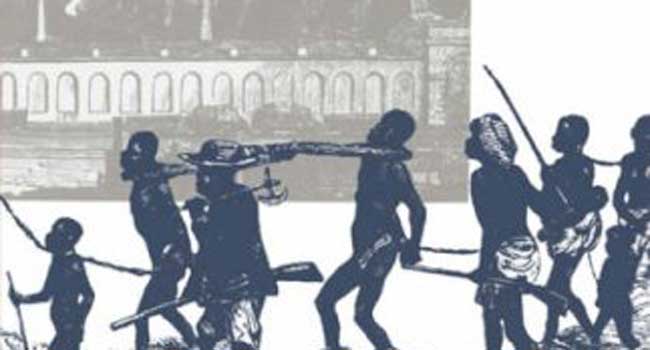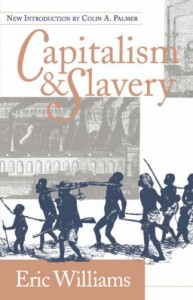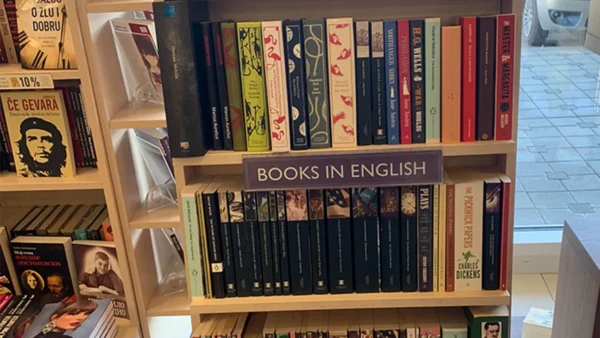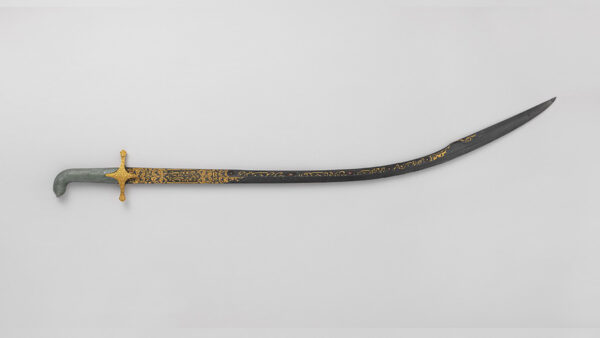This book does an excellent job of showing exactly how the development of British capitalism was dependent on slavery. The author is Eric Williams, an obscure PhD student at the time of writing, but later in life to become Prime Minister of Trinidad & Tobago.
Williams goes through his evidence in systematic detail, examining British economic and political development in the 17th, 18th and 19th centuries and showing the role of slavery at every turn. Great banking families like the Barclays and the Barings got their start as slave traders. Insurance firms like Lloyd’s of London made big profits from insuring slave traders against the death of their cargo.
Britain made fantastic profits from the Triangular Trade – manufactured goods to Africa, slaves from Africa to the West Indies, sugar from the West Indies back to Britain. The towns of Bristol, Liverpool and Glasgow grew rich on this trade – Bristol’s West India trade in the 18th century, for example, was worth twice as much as all its other overseas trade combined.
More than that, the Triangular Trade gave an impetus to other British industries. Birmingham alone exported 100,000 muskets a year to Africa, most of them exchanged for slaves. Sugar refining became a major industry in Britain (it was banned in the colonies). The wool and cotton industries got a massive boost, both from the import of the raw material from the West Indies and later mainland America, and from the new markets for the export of their finished goods.
The Industrial Revolution itself was financed largely from the profits of the slave trade and slave-produced sugar. James Watt, for example, depended on capital accumulated from the West Indian trade to finance the development of his new invention, the steam engine. A key figure in the development of the slate industry, Lord Penrhyn, made his money from sugar plantations in Jamaica. The Bristol West India interest played a prominent role in the construction of the Great Western Railway. And so on. Williams documents so many ways in which the development of British capitalism was dependent on the capital reaped from slavery.
Britain’s abolition of the slave trade in 1807 and emancipation of the slaves in 1834 are presented not as humanitarian achievements, but as driven by economic imperatives. Slavery was essential in the early development of the West Indian colonies, when labour was scarce. English migrants would want land of their own, not to work in extremely harsh conditions on a sugar plantation, and in any case the numbers were not sufficient. A supply of slaves from Africa allowed the sugar industry to grow as it never would have otherwise.
But by the early 19th century, the situation had changed radically. The plantation owners had become so rich and powerful that they held Britain to ransom. West Indian sugar held a monopoly in Britain, and the plantation owners used that to their advantage, deliberately limiting supply so as to drive up the price. With free labour and a guaranteed market, they made huge profits, even though their production was inefficient. With no incentive to modernise, they remained hopelessly outdated compared with other industries and nations, but made money anyway.
Britain had changed too. The Industrial Revolution, financed by capital from the colonial trade, created booming industries which demanded ever more markets for their goods. Free trade, not mercantilism, was now the order of the day. The wealthy industrialists wanted to trade with India, Brazil and other markets around the world that could offer cheaper raw materials, and resented the fact that the plantations in the West Indies were propped up by slave labour and a guaranteed market. They also resented the diversion of capital to these now unprofitable islands. A final imperative was to obtain cheap labour for their own factories, and this was difficult when the cost of basic goods like sugar was so high – they wanted to import it more cheaply from other sources.
There’s so much in this book, so many details and statistics to back up the basic thesis: that slavery played a big role in financing the Industrial Revolution, and that mature industrial capitalism then helped destroy the slave system which was no longer in its interests.
All of which leads me to wonder why, studying history at Oxford in the late 1990s, I never learned any of this. I actually studied eighteenth century British history in depth, under the tutelage of one of the experts in the field, and yet I don’t remember the West Indies or the slave trade coming up very often at all. It wasn’t that their existence was denied – it was just that they weren’t mentioned very much. The Industrial Revolution was presented as an internal British occurrence. The north American colonies were studied in more detail, yes, but Barbados? Jamaica? Those unfortunate dealings on the African coast? Strangely absent. Given that Williams wrote this book back in 1944, the arguments he makes are hardly new, and yet they felt new to me, and I find that shocking.
Of course I take responsibility for my own ignorance – at university level, you can decide what to read beyond the set reading list, and I could have discovered all this for myself. Yet I wonder how such a glaring gap could exist, and whether history is still being taught like that at Oxford today. Coincidentally, my wife was watching the BBC show The Great British Bake-Off recently, and it included a segment on the history of sugar. The segment talked about the high price of sugar and the conditions of the poor British sugar refiners, but neglected to mention the conditions of the people cutting cane in the Caribbean. In fact, it neglected to mention where sugar came from at all. Now I know a cooking show is just entertainment, but it’s that gap again. Are we really so fragile that we can’t handle even a brief mention of the truth?





There are 23 comments
Sounds interesting Andrew … and reading synchronicities hit yet again. William Dawes, on whom the book I’ve just reviewed was based as you know, got involved in the antislavery movement when he had to leave NSW. He had wanted to stay in NSW but refused to apologise to the Governor for his statement that he would not take part in any further punitive expeditions against the indigenous people (after being talked into taking part in one) and so was sent home.
Anyhow, I’m not English but did study a reasonable amount of English history and I must say that the slavery issue had very low profile for me too. I’ve learnt more about it in recent years through discussions about the brief reference to it in Austen’s Mansfield Park and the recent feature film on Wilberforce, than I’d learnt in the few decades before! And that’s a bit embarrassing really.
Those reading synchronicities are interesting! Two people on opposite sides of the world reading about a similar issue at the same time. Thanks for sharing your experience of English history as well. It is a bit embarrassing, isn’t it!
Yup, I think culturally we are very, very fragile about admitting that we did something wrong. Have you been following the news about Jimmy Saville from Jamaica? The posthumous revelations about his paedophilic activities has practically brought the BBC to the brink of collapse because of the extent and scale of the witchhunt. Now while I in no way condone his actions, at ALL, it seems to me a bit unbalanced not to take into account how different the world was in the 1970s, before paedophilia had been invented by the media. One day in the future, probably when it’s too late, laws will be introduced to prevent people acting in environmentally unfriendly ways. Will our children’s children be ostracised and jailed for the way we are behaving now? Quite possibly. Slavery is also without justification, but at the point in history you discuss, it was wholly accepted by the civilised world. That doesn’t make it right, but the inability to discern culturally between the horrors of the past that we are relieved no longer happen and a sense that any stain of criminality scars a person or a nation forever may well be one of the reasons why it is covered up now, rather than openly confessed. I do feel that if we could be more discerning in our attitude to wrong doing, we could actually end up behaving far more ethically in the long run.
Hi litlove
Thanks for your comment. I don’t see why you were cringing over it! I know what you meant. I think the retrospective judgements are a big part of why we don’t want to talk about it. Personally I’m not so much interested in saying that Mr Barclay was a bad man for dealing in slaves – what’s more important to me is the way this book shows how important slavery was in the development of modern Britain. I think that as a country, we need to be more aware of this – not to beat ourselves up over it, but to reach a fuller understanding of who we are and where we came from.
Andrew, combined with Walter Rodney’s How Europe Underdeveloped Africa, Williams’s book make a strong case for reparations. I only discovered these books because of my so-called radical teachers at Jamaica College. Rastafari. Speak about the half that’s never been told. Give thanks for the great work you are doing here.
Walter Rodney’s book is a real eye-opener too! I’m glad you like what I’m doing here. It’s amazing that these points of view are still so rare. There was an interesting preface in Eric Williams’s book about the struggle he had getting it published. He had to subsidise the printing of it himself, by raising subscriptions from prominent people in the Caribbean and African American communities. Otherwise it would probably never have seen the light of day.
Superb commentary Andrew. This sounds like my kind of book.
At least when reading American history I do find that the slavery economic connection pops often commonly.
It is a little depressing when one thinks how quickly and easily people have and continue to inflict horrendous suffering and injustice on others for their own personal gain.
Thanks Brian. That’s good to know, about American history. My reading in that area hasn’t been very wide. I do remember, though, an introductory class on American history in my first week at Columbia (it was a kind of orientation for us foreigners!), in which the tutor explained how the constitution ensured that everyone was equal and had a right to vote – neglecting to mention that it excluded women and slaves and poor people. She then explained the westward expansion, saying that the settlers “pacified” the Native Americans! So some people do have a blind spot – but I’m glad to hear that she was probably an isolated case!
I agree, it’s very depressing, the things we do in the name of profit.
I found this topic fascinating when I studied it, so I’m hovering over the button that will copy the details into my buy-soon list. I didn’t know about current banking companies though, and the inclusion of well-know current elements is particularly intriguing. From a modern perspective, the drive for economic success is difficult to comprehend but still interesting.
Regarding your study, where I currently am we learned quite a bit about what you’ve discussed, the economics of the slave trade as well as abolition. I can’t say I’ve seen a lot of mentions elsewhere however. It’s a little further on than slavery and focused on the social, but I’d recommend Tom Reiss’s The Black Count – about Dumas’s father but it has a heap of information about slavery and life for the freed slaves.
Ah, don’t hover, Charlie, click!!
Thanks for the recommendation about The Black Count. It sounds fascinating – I’ve always wondered about Dumas and his background, and am glad it has more general information too. I’ll check it out.
Apparently, we are only bombarded by what those in high places feel proper for us to know. But truth is always out there and we need to dig into the rubble most often than not just to get at them. Thanks for reading and recommending this book, this is most definitely going on the wish list.
Hi Claire
I agree – the truth is always available, but it’s often hard to dig out. What we are bombarded with is usually a distraction. Glad you liked the review, and hope you enjoy the book if you do end up reading it!
I have been cringeing over my comment here all week, as it came out all wrong and I haven’t known what to do about it! I was thinking that there had to be a difference between disobeying a law, and taking an unfair advantage when everyone else was doing it. And of course there is, it’s the difference between morality and ethics. Economics has no ethics because it has no interest in the humanity of the human behaviour it observes. So whilst actions in the past may not have been morally wrong, they were certainly ethically wrong. Okay, well I feel better for having written that!
Aw, I feel bad that you were cringing all week. As I said higher up, I know what you meant. Thanks for coming back to clarify, anyway. In future, if something comes out wrong, you can always email me at info@andrewblackman.net asking me to delete or edit your comment. I hate the idea of you feeling bad over something you wrote, and not knowing what to do about it.
By the way, my lack of response was not any kind of reflection on your comment, if that’s what you were thinking. Just had a really busy week and hadn’t got around to replying to any of my comments!
You are a sweetie! Thank you for the reassurance. That’s really nice of you, and thank you for the email, which I will file away for future use!
As always what I like about your posts is that you don’t shy away from the uncomfortable truths… such as the ongoing miseducation with respect to world history…my own introduction to Williams’ writing in college was From Columbus to Castro…it was eye opening. One book I read recently that you might also find interesting, given this post, is the Sugar Barons which is actually by a British historian (I don’t read a huge number of history books but this one was quite compelling and fairly even handed)… Sugar by Elizabeth Abbott (a Canadian with Antiguan roots) is also on my to be read list.
Hi Joanne
Many thanks for the comment and for the recommendations – those books sound very interesting! Will add them to my list of books to read.
Hi Andrew,
Many thanks for your useful information, Is there any more info on James Watt being a capitalist that you know of?
Thanks Again
Hi Isabel
Thanks for commenting. I remember that there was more detail in the book, but I don’t have it to hand right now – sorry about that! If you can track the book down in your library, or perhaps search it on Google Books, you might find the relevant passage. Good luck!
I am sure, I won’t be charged of blasphemy at the end of it all but seriously you are an eye opener. Carte blanche typical. My reading of your thesis has been more than just a reading, it was revelatory. It made me appreciate our existence although by default as Africans in the plantations. We were victims but contributed immensely to the building up of European economy especially in the West Indies
Thanks for your comment, and I’m glad it was helpful for you. I’d recommend reading the book itself, which has a lot more detail than I could get to in this post, especially on the issue you raised of African people in the plantations contributing hugely to the European economy. It’s an old book, but still extremely relevant today. I think you’d really get a lot out of it.
awesome review Andrew, i am a masters student and this book was recommended for reading by my professor before i fall on to this brief and interesting review. thanks for the review. just like much truth hidden by the 4th arm of government of course the media, educational syllabus in the west are still censored, i thought institute like oxford were centers of knowledge and and research by its surprised me to read ya review just like the truth behind 9/11 was hidden and us and British war against Iraq, so black history is still censored. and ICC being court against African leaders only.
thanks Andrew for an awesome review, it helped me in preparing my examinations on capitalism. it is explicitly explained and easy to understand.